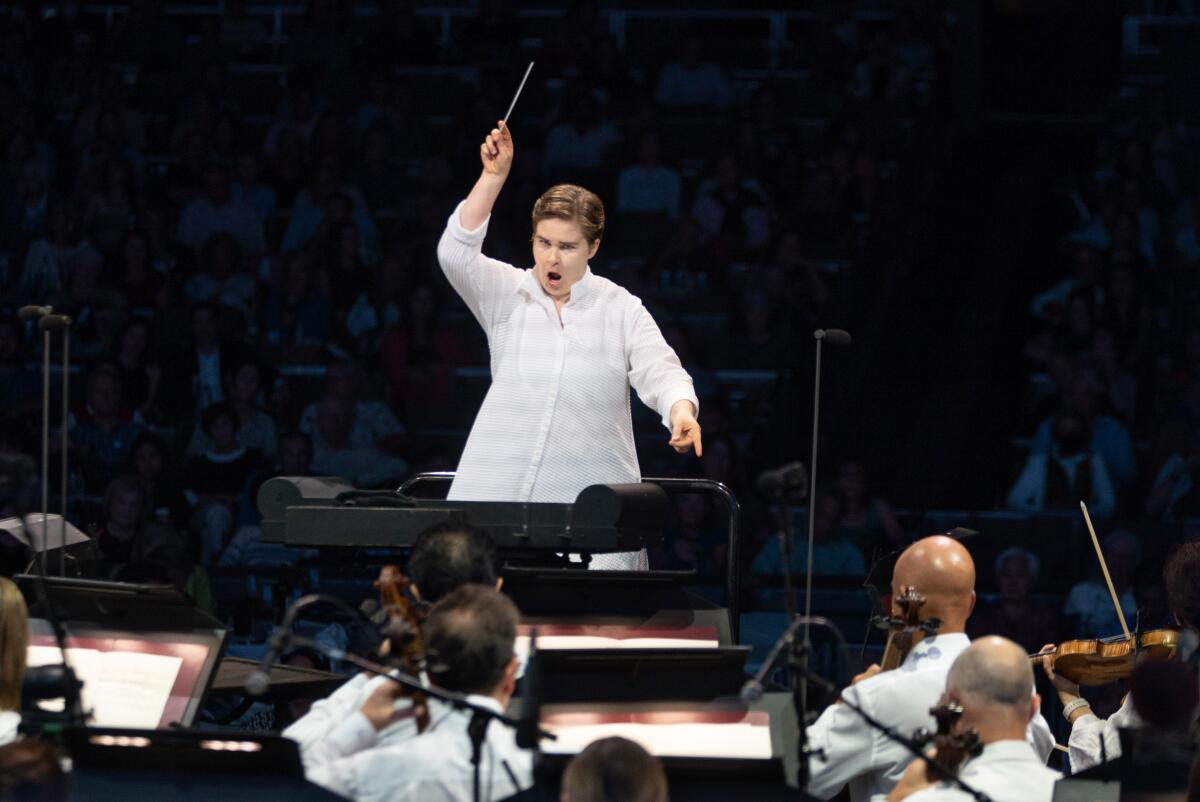Review: The exult and ecstasy of Beethoven’s Ninth at the Hollywood Bowl

- Share via
The Los Angeles Philharmonic is winding up its celebratory Hollywood Bowl summer (100th anniversary) in time-honored territory. This week it performs Beethoven’s Ninth Symphony, ever the work to raise spirits. The next two weeks feel like home, highlighting familiar faces (notably Nicholas McGegan, Martin Chalifour, Itzhak Perlman and Lang Lang) and beloved composers (notably Mozart, Bach and Tchaikovsky).
Tuesday night there were more familiar faces, namely orchestra members who had been away for August vacation and were back for the Ninth, which repeats on Thursday. But there were also the last of this season’s Bowl debuts. The Finnish conductor Eva Ollikainen had the rare honor of only leading a symphony that is usually the exclusive domain of the music director (the Ninth is a Gustavo Dudamel specialty) or stellar guest conductor.
And not just once. The L.A. Phil had enough faith in the 40-year-old maestra, who is artistic leader and chief conductor of the Iceland Symphony Orchestra, to entrust the Ninth to her for two nights, a real rarity for a conductor making a debut with the orchestra at the Bowl. Not only that, but she is further slated to lead the L.A. Phil for a subscription program next season at Walt Disney Concert Hall with the exceptional pianist Pierre-Laurent Aimard as soloist.
There was yet another debut of sorts with Samy Moussa. The Canadian composer, who has been championed by Kent Nagano in Montréal and is beginning to attract attention in Europe, is little tracked so far by the U.S. new music radar. On Tuesday Ollikainen led the U.S. premiere of Moussa’s “Elysium,” demonstrating within the first minute or two of the 12-minute score — the orchestra rising from its quiet depths with mysterious sliding glissandi that felt like a magical slipping out of the mundane — that we are late to the Moussa game.
Late, indeed. Nagano’s recording with the Moussa’s award-winning 2019 Violin Concerto (“Adriano”) with the Montréal Symphony is already evidence of an original voice. Christian Thielemann led the Vienna Philharmonic premiere of “Elysium” last year. He paired it with Bruckner, and Moussa produced a vast 21st century Brucknerian orchestral canvas grand enough to fill your senses with sound.
But “Elysium” proves an equally handy prelude to Beethoven’s Ninth. The Homeric paradise that inspired Moussa is also the place where Beethoven’s symphony is headed. In the famous “Ode to Joy” Finale for vocal soloists and chorus, joy is, in Friedrich Schiller’s text, the daughter from Elysium, the heavenly sanctuary in which “All men shall become brothers.”
Moussa, who is 38 and based in Europe, has his own take on rising to elevated realms. But he is no stranger to ecstasy. His orchestra is a kind of cauldron in which his themes grow, transform, come to life and become energized. Once or twice in twinkling climaxes he can get a little corny, but he catches himself and shows there is profundity just over the rainbow.
If he relies on those glissandi more than he seemingly should, he nevertheless makes them welcome. He convinces you that you want to go where he’s going. If I had my way, the mere dozen “Elysium” minutes would have been repeated after the Beethoven, and under most circumstances nothing should dare follow the Ninth.
That preference may have had something to do with Ollikainen. She is a powerhouse. She has the Sibelius Academy training that values clarity and rhythmic acuity. She likes thin textures, and one could imagine “Elysium” more robust, more Viennese, but she gave it strength and color and uncovered its imagination.
Her Beethoven especially conducted power. Rather than following the mystery of Moussa with Beethoven’s own primordial symphonic opening, she emphasized primordial percussion, dinosaurs pounding the earth. She was fast and furious. She allowed the music few breaths, but rather piled phrase upon phrase. She threw herself into the symphony for a full hour (it was a fast performance). She exerted impressive control but allowed the players little room for individual expression.
The sensation was that of Beethoven coming straight at you, no ducking, which could be both exultant and crude. The Scherzo was particularly like that, and so was the Finale.
She had the misfortune of veteran bass-baritone Nathan Berg sounding untypically in vocal trouble. The other three vocally hefty soloists — soprano Michelle Bradley, mezzo-soprano Rihab Chaieb and tenor Joshua Blue — threw themselves into the fray, as did the Los Angeles Master Chorale. Neither orchestra nor singers maintained tidiness at Ollikainen’s unrelenting tempos, but the fury had its own quality of Beethoven overcoming adversity in finding joy, Elysium’s daughter.
Does anyone even talk about brotherhood and sisterhood anymore in our age of division? Ollikainen’s Ninth was not probing, musically rich Beethoven. But she presented Beethoven in the heat of battle in the fight for brotherhood and sisterhood. And she didn’t give an inch.
'Elysium' and Beethoven's Ninth
Where: Hollywood Bowl, 2301 N. Highland Ave.
When: 8 p.m. Thursday
Tickets: $12-$130
Info: (323) 850-2000, hollywoodbowl.com
More to Read
The biggest entertainment stories
Get our big stories about Hollywood, film, television, music, arts, culture and more right in your inbox as soon as they publish.
You may occasionally receive promotional content from the Los Angeles Times.











